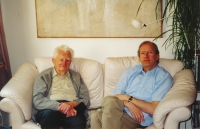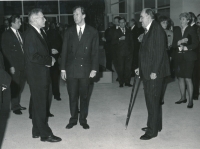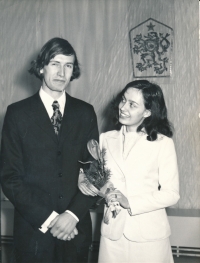Suddenly I understood that an undiscovered dimension was dormant in me

Download image
Martin Zlatohlávek was born on 25 April 1954 in the Central Bohemian village of Velim into the family of an evangelical pastor, Jan Zlatohlávek. He grew up alongside his three older siblings in the Evangelical parish in Velim. He never joined Pionýr and did not participate in ideologically oriented events, because of which he experienced bullying at school from the teaching staff. From childhood he was convinced that he would follow in his father’s footsteps and become a parish priest. In September 1969, he entered the Grammar School in Kolin. In January 1973, he applied to the Comenius Evangelical Divinity School. Despite difficulties, he finally got into the faculty and in October of that year he entered. After the first semester, the students decided to express their opposition to the withdrawal of state approval for the exercise of clerical activity. They wrote a petition letter to the Secretariat for Ecclesiastical Affairs in support of clergy without state approval, which was signed by twenty-two students, including Martin Zlatohlávek. In the end, he was expelled along with four other classmates because of this. Martin Zlatohlavek refused to simply give up, so he tried to find representation from other church congregations and the Synod Council of the Evangelical Church of Czech Brethren, but to no avail. In October 1974 he started working as a salesman in a bookshop in Na Příkopě Street, where he worked for two years. In the spring of 1975 he took part in a protest action with Michael Kocáb and Aleš Březina during a thanksgiving service for the victory over Nazism. In February 1976 he married Blanka Trojanová. From 1976 to 1978 he was on basic military service in the command company in Pardubice. He was supervised by military counter-intelligence and his correspondence was checked (VKR); the files of the Security Forces Archive show that many of his fellow soldiers wrote reports on him. During the normalisation period, he attended housing seminars, for which he was interrogated at the State Security Bureau (StB) in Bartolomějská Street. From 1979 he worked as a depository manager at the National Gallery. In 1985, a daughter, Eliška, was born to Mr and Mrs Zlatohlávek. From 1988 to 1992 he studied at the Department of Art History at the Faculty of Arts of Charles University. During November 1989 he participated in a number of demonstrations. From 1990 to 1995 he studied at the Faculty of Theology at the University of Amsterdam (Universiteit van Amsterdam). From 1994 to 1998 he served as director of the National Gallery. In 2022 he lived in Prague.











